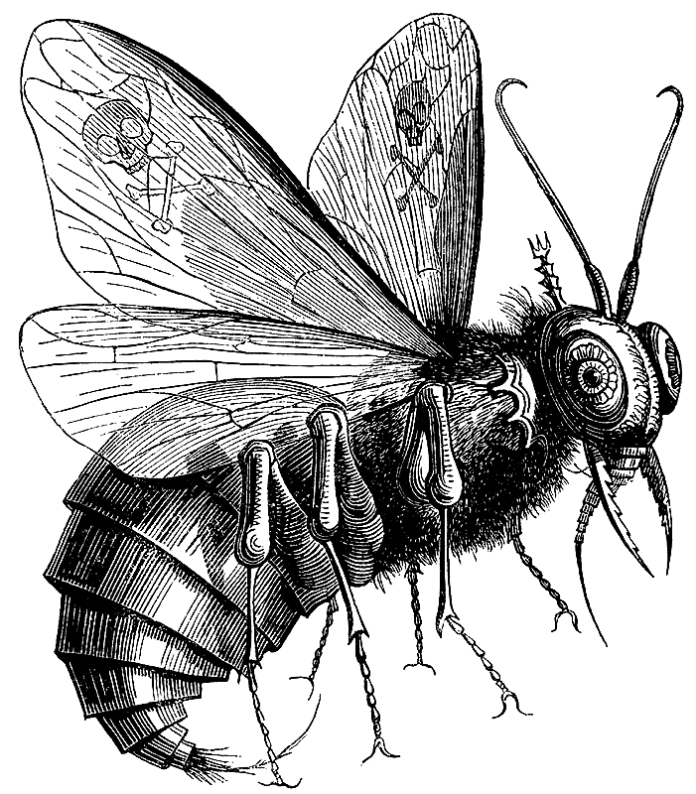Beelzebub, mentioned in 2 Kings, was a prince of demons worshiped by the Philistines, whose most famous warrior was Goliath killed in battle with a slingshot to the head by the Jewish boy David. The Philistines probably occupied an area of modern Palestine.
In 1714 the Dutch writer Bernard Mandeville (1670-1733) published in English his infamous book The Fable of the Bees (alternate title Private Vices, Public Benefits). The main premise of his book, that vice is a positive good in society, startled his contemporaries and evoked condemnation from many directions. Mandeville argued that an idle member of the upper class spends wastefully on tailors, cooks, wine cellars, travels, and prostitutes; but the result of all this spending on himself is that he gives employment to others who provide him with goods and services. Vice, therefore, is really economic virtue and should not be condemned as such. As he put it, “Pride and Vanity have built more Hospitals than all the Virtues together.”
Mandeville compares the human race to one vast beehive: “They that examine into the Nature of Man … may observe, that what renders him a Sociable Animal, consists not in his desire of Company, Good-nature, Pity, Affability, and other Graces of a fair Outside; but that his vilest and most hateful Qualities are the most necessary Accomplishments to fit him for the largest, and, according to the World, the happiest and most flourishing Societies.”
This way of thinking reminds us of a certain biblical warning: “Woe to those who call evil good and good evil, who put darkness for light and light for darkness, who put bitter for sweet and sweet for bitter.” (Isaiah 5:20)
Believing himself to be a thoughtful philosopher, all Mandeville proved was that he had a criminal mind well honed to justify the worst of crimes. Mandeville argues spuriously that the murderer and the thief actually contribute to society because they give employment to policemen and lawyers. War is good because it gives rise to new technologies and stimulates the economy. Low wages are good because they make a man work harder to survive and improve his lot. Prostitutes serve society by giving employment to the physicians who must combat the diseases they spread. Widespread ignorance is good because it gives employment to teachers. Promiscuity is good because it give employment to the abortionist. Obesity and drunkenness are good because they stimulate employment of dietitians and counselors. Sin itself is a good because its rapid spread galvanizes the oratorical powers of the man in the pulpit.
Has there ever been a more outrageous piece of sophistry?
We do not get from Mandeville any sense that vice in itself is inherently wrong. There is in him no inkling of the need to chastise evil doers. Indeed, from Mandeville we get the same sense that the poet John Milton gave to Satan in Paradise Lost when he made him say, “Evil, be thou my good!” One wonders how well a society could function if more and more people adopted his philosophy. How many more lives would have to be ruined before the world would see that there is no consolation to be found in evildoing? How many more social ills would become so pervasive that few people of good will would be found left to address them?
Samuel Johnson, a contemporary of Mandeville, said in Boswell’s Life of Johnson: “Mandeville puts the case of a man who gets drunk at an ale-house; and says it is a public benefit, because so much money is got by it to the public. But it must be considered, that all the good gained by this, through the gradation of alehouse-keeper, brewer, malster, and farmer, is overbalanced by the evil caused to the man and his family by his getting drunk. This is the way to try what is vicious, by ascertaining whether more evil than good is produced by it upon the whole, which is the case in all vice…. I read Mandeville … years ago. He did not puzzle me. He opened my views into real life very much. No; it is clear that the happiness of society depends on virtue.”
This of course is not the view of the man committed to evil. “Evil, be thou my good” is his motto, as it was Satan’s before him.
Many in prison have come to learn the hard way what Mandeville neglected to mention in his book. Bees sting, and sometimes even kill. Wisdom commands avoiding their nest just as the honey of sin draws us near.


